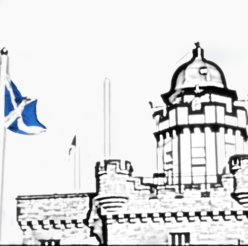Leanne Clapperton
Death, or the fear of death, forces most people without question to put on a mask, gloves, wash their hands, and spy on their neighbours to check if they too are abiding by the rules. However, what if you had no fear of death, how would you be feeling just now, through this pandemic? I think I am one of those people. I already live in a reality where time has changed, my comfortable social structures disappeared overnight, and people became socially distanced. Two years ago, I watched my beautiful 12-year-old son die from brain and spinal cancer.
I can remember clearly, when he took his last breath in our bed surrounded by me (his Mum), Dad, brothers and dog (tucked beautifully along his legs). This felt a familiar experience, it somehow felt like the birth experience but in reverse. I had supported him into the world, and now I was supporting him out of the world, I would have travelled with him if somehow possible. There are no words that are adequate to describe being present as the bodily processes begin to shut down, to observe it feels like an out of body experience. Yet, paradoxically you are more present than you have ever been. There is point when consciousness is lost and you can see and hear the person taking Cheyne-Stroke breaths, but at the same time there can be a very strong feeling they have already left…
I think comparatively about people in hospital unable to be with their loved ones in their final days and hours. Although it is impossible to know how a dying person feels, it must be even more confusing and frightening alone with no physical contact. Social distancing appears to have taken over every aspect of our reality, right up until death… I wonder if it will become more normalised with all the public numbers of the Covid deaths, or will it be feared more. Or it may be tucked away in books and research, similar to the deaths in concentration camps. What I do know is more control and choice have been taken away from vulnerable and dying people on a global scale. I think of how I would have felt if I had been unable to be with my son through the last moments of his life. It is unimaginable, I am not sure I would still be alive. Unfortunately, I am not speculating, a 13-year-old boy did die alone in London not long into lockdown.
Going forward, the fallout from the pandemic will be immeasurable. I know only too well how many years it can take to try to process a disease that ravages the body. Focus nationally has been for our NHS heroes, and while they are doing a brave job, there is no experience that takes more bravery than dying. Pre-pandemic, people could be present and support their loved ones through the only predictable process we will all face. I see pictures in the paper of faces that have lost the battle to Covid, yet very few of us can really imagine what it is like to go through that process we simply refer to as ‘dying’. When we watch images from hospitals, we focus on the machines, equipment and staff, what about the human under the machines?
Death is one of the most severe and complex social events that will occur in a person’s life. I wonder what happened to the end of life care plans, the wishes, rights and values of the person dying in isolation. How can we dictate the personal and individual experience of dying? Through my own experience it makes me think how little consideration there is about dying through this pandemic, only we are made to believe it needs prevented at all costs.
Leanne Clapperton is a 45 year old Sociology student living in Edinburgh with her family. Leanne enjoys all sociology subject matter but is particularly interested in the social aspects of death, dying and bereavement.

This is such a strong and human story. We need to talk more about death and dying and I am very grateful to Leanne for sharing her experiences.